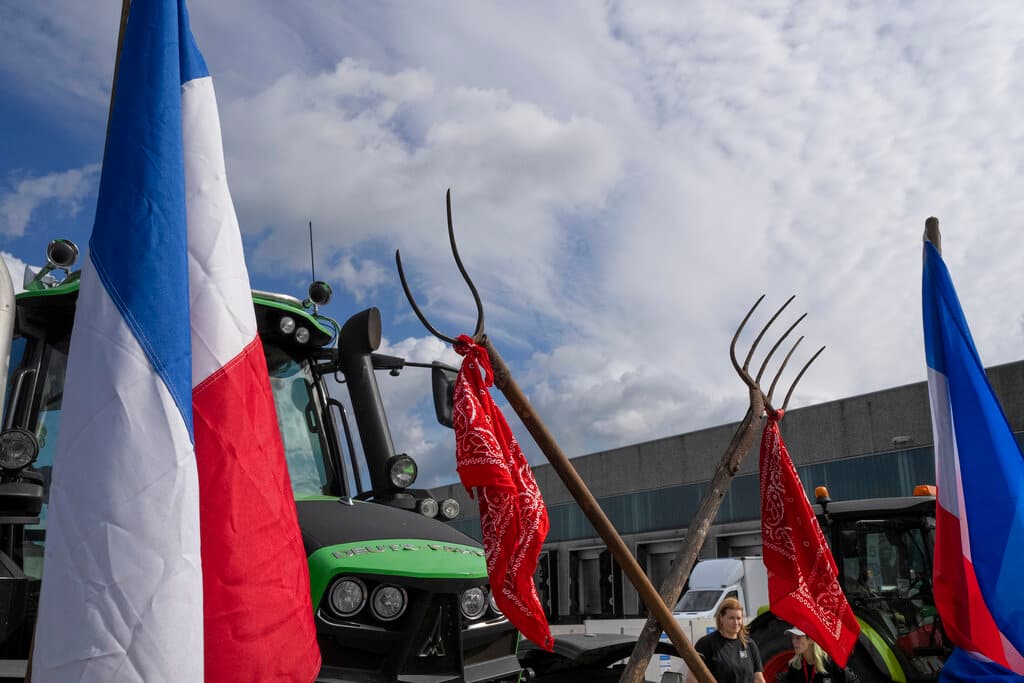Trudeau’s Plans to Combat Climate Change Rebuked by Farmers, Agriculture Leaders
Similar schemes by governments in Europe have sparked weeks of protests across the continent and fury in the Netherlands.

A plan by Prime Minister Trudeau of Canada to combat climate change by reducing the use of fertilizer is under fire from provincial leaders and farmers who say it will reduce output, cut into farming income and increase food prices at grocery stores at a time when the nation can ill afford it.
Similar proposals in Europe have led to furious protests in the Netherlands and elsewhere. Canadians acting in solidarity with those protests took to the streets of Ottawa and other Canadian cities over the weekend to vent their frustrations.
Dozens of vehicles bearing Canadian and Dutch flags staged a “slow roll” through parts of the Canadian capital Saturday and protesters carried signs reading “Freedom,” “Hold the Line,” and “Stand with Farmers or Eat Crickets.”
If Mr. Trudeau gets his way, those outward-focused protests could turn inward and morph into protests similar to the so-called “freedom convoys” of truck drivers irate about pandemic-related policies that brought Ottawa to a near-standstill earlier this year
In the name of combating climate change, Mr. Trudeau’s plan is to reduce farmers’ emissions of nitrous oxide, a greenhouse gas, by 30 percent by 2030.
The plan is similar to the measures taken by the Dutch government. Dutch farmers have been told they must reduce their use of fertilizers by 50 percent during the same time period for many of the same reasons.
The Canadian federal government’s goals came up during a meeting Friday in Saskatoon of the federal minister of agriculture and agri-food, Marie Claude Bibeau, and her provincial counterparts from Alberta, Ontario and Saskatchewan. After the meeting, the provincial agriculture ministers called Mr. Trudeau’s fertilizer plan worryingly arbitrary.
“Fertilizer emissions reduction was not even a topic on the agenda of the annual meeting,” the government of Saskatchewan said in a statement released after the meetings. “Provinces pushed the federal government to discuss this important topic, but were disappointed to learn that the target is already set.”
Saskatchewan’s agriculture minister, David Marit, was even more blunt in a press release sent to local news outlets following the meeting.
“We’re really concerned with this arbitrary goal,” Mr. Marit said in the release. “The Trudeau government has apparently moved on from their attack on the oil and gas industry and set their sights on Saskatchewan farmers.”
The Trudeau government has said it wants a 30 percent reduction in emissions only — not necessarily in fertilizer use — and hopes to meet the goal through “research and innovation.” Farm producer groups say that, for the time being, reducing nitrous oxide emissions without reducing fertilizer use is impossible.
An industry group, Fertilizer Canada, warned that the new emissions goals could be financially devastating to farmers across the country.
“It is estimated that a 30% absolute emission reduction for a farmer with 1,000 acres of canola and 1,000 acres of wheat stands to have their profit reduced by approximately $38,000 – $40,500/ annually,” a report by the group said.
Dutch farmers have for weeks been blocking major roads and food distribution centers with tractors and other farm equipment to protest similar edicts by the government there to reduce fertilizer use and restrict livestock farming in the name of fighting climate change. The farmers say the government’s plans will put many of them out of business.
The Dutch government says the plans are necessary to protect some 150 wildlife refuges across the country and to meet European Union limits on greenhouse gas emissions.
Similar, but more severe, limits on the use of fertilizer have also been cited as one of the reasons Sri Lanka’s economy collapsed in recent months, causing widespread unrest and the prime minister to flee the country.
In the spring of 2021, Sri Lanka’s president, Gotabaya Rajapaksa, banned synthetic fertilizers and pesticides and forced farmers there to go all-organic on the crops. The move was intended to encourage more environmentally friendly, sustainable farming. It instead led to a collapse of agricultural output and widespread hunger.

